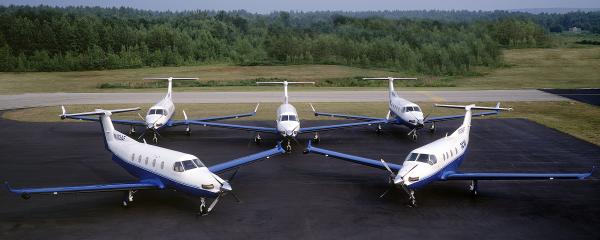

The plane is called a Pilatus. They are turboprop (meaning: jet engines turning big propellers) corporate aircraft that carry two pilots and six to eight passengers. They go more than 300 miles an hour, for a range of about 2,000 miles. Its cabin is bigger than that of a Citation Jet, but the plane could land and take off at Middlebury Airport. They cost $3.5 million apiece. Pilatus planes are being used in the same way that small jets are - for transporting executives and wealthy people to their meetings and vacations. And that's what I do, too. Scott Todd, limo driver to the rich.
| Alpha Flying is a "fractional ownership" company, which means that people buy into a share of an airplane. For tax purposes, they buy an actual 1/8 or 1/4 or 1/2 of a single plane, but for practical purposes they're buying their way into the fleet of Alpha's aircraft. (As of April 2007, Alpha Flying has about 25 of these planes, and continues to grow by 6-7 planes a year.) What they get for their money is a certain number of hours in any of the planes, and they use these hours to go on medium-range trips (i.e. not to California) and into smaller airports that are closer to their destinations than are the big airports. The company has been growing steadily since its founding 14 years ago. |
 |
 |
I used to sit in the right seat and fly the plane half the time. I then upgraded to captain, so now I sit in the left seat and fly the plane half the time. I have an odd schedule: my "weeks" are ten days long: six days on duty, four days off. This is pretty standard stuff in the corporate flying world. The day before a flight, the operations people will call and tell me a "showtime." Showtime is one hour prior to the first flight of the day, which gives room for pre-flighting the plane, gathering together the appropriate navigation charts, getting catering organized, etc. |
Alpha flies mostly up and down the East Coast, often as far down as Florida, occasionally as far west as Denver.
|
My job description was put this way by one of the managers: "Arrive at your showtime, and expect to be gone for six days." Though not the norm, it is possible for me to spend five consecutive nights in hotels. I have also gone an entire six-day work cycle without ever being called in to work at all. On average, I probably work five of my six days, and am away from home four days out of ten. |
 |
